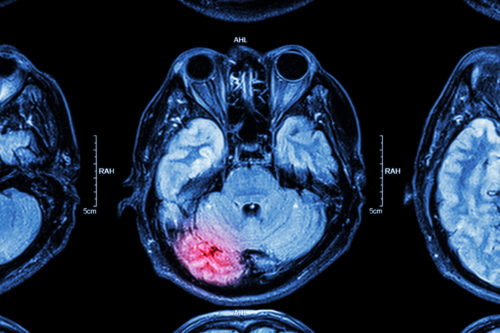Traumatic Brain Injuries Following Car Wrecks and Workplace Accidents
Brain injuries can be caused by car wrecks, 18 wheeler crashes, workplace accidents, and falls. A traumatic brain injury occurs when an outside force causes the brain to malfunction. That force can be a blow to the head or a jolt to the head or body. Also, an object like a piece of the skull or metal can penetrate the brain and cause injuries.
Brain injuries can be mild. Mild injuries cause temporary malfunctions or more severe. Serious traumatic brain injuries can result in bruising, torn tissues, bleeding and other physical damage to the brain. Serious brain injuries can result in long-term complications or death.

What Are the Symptoms of a Traumatic Brain Injury?
A severe brain injury can result in life-altering changes. The signs and symptoms of a serious injury may not be obvious right away. The symptoms may develop in the first few days after the injury. Also, people with severe brain injuries may not show visible signs of disability. However, they may suffer from:
Physical symptoms
- Loss of consciousness
- Severe headache that doesn’t go away or gets worse over time
- Vomiting or nausea
- Convulsions or seizures
- Pupil dilation of one or both eyes
- Clear fluids draining from the nose or ears
- Inability to wake up from sleeping
- Weakness or numbness in fingers and toes
- Loss of coordination
Cognitive or mental symptoms
- Confusion
- Unusual behavior, including acting out and aggression
- Slurred speech
- Coma and altered consciousness
Children’s symptoms
Kids may not be able to tell you what is happening to them or what they are experiencing after a brain injury. If your child has suffered a blow to the head in a car wreck or while playing sports, look for the following symptoms:
- Changes in eating or nursing habits
- Persistent crying or agitation
- Unexplained irritability
- Inability to pay attention, beyond what is normal for your child
- Change in sleep habits
- Unjustified sadness or depression
- Loss of interest in activities or toys that they once enjoyed
My son once suffered a concussion on the soccer field. We weren’t sure if he had been seriously injured so he continued to play. He spent the majority of his time in the game looking at his fingernails. This isn’t normal for him. After we pulled him from the game he started vomiting. Luckily for us, he did not have a severe brain injury. However, his symptoms were consistent with trauma.
What Causes Brain Injuries?
Most of us understand that a blow to the head or some type of shrapnel entering our brains can cause injury, we may not be clear as to why. Here are some causal connections between the trauma and the injury:
- Brain cells can be directly damaged at the point of impact
- The brain may bounce back and forth inside of the skull after a severe jolt or impact. This causes multiple points of impact where brain cells can be damaged.
- Severe rotation or spinning, for example during a car accident, can cause tearing of the cellular structure.
- An object penetrating the skull can cause severe, irreparable damage to brain cells, blood vessels, and protective tissues around the brain. This can also introduce infection into the brain.
- Brain bleeds, clots, and swelling can deprive the brain of oxygen, permanently damaging the cellular structure.
Events that Commonly Lead to Brain Injuries
Although brain trauma can be caused by an impact to the skull or jolt to the body, they are commonly caused by:
- Falls: Falling off a ladder or elevated platform at work or falling in a nursing home or hospital.
- Car wrecks: Whether you are in a rear end collision or hit by a drunk driver, car wrecks are very common causes of brain injuries.
- Violence: About 20 percent of traumatic brain injuries are caused by violent acts such as gunshots or shaken babies.
- Sports injuries
- Explosive blasts: Researchers believe that pressure waves passing through the brain disrupt proper brain function.
- Shrapnel or debris entering the brain: For example, after a plant explosion, metal debris may fly through the air impacting nearby workers.

What Harm Can Be Caused by Brain Injuries?
Severe damage and complications can occur immediately after a traumatic brain injury. Or they may occur several days later. Whether the injuries are permanent or temporary is related to the severity harm. Complications can include:
- Coma or persistent vegetative state
- Brain infections
- Locked-in syndrome where a person is awake and aware, but unable to communicate.
- Nerve damage including:
- Paralysis of facial muscles
- Damage to the nerves responsible for eye movements, which can cause double vision
- Damage to the nerves that control sense of smell
- Loss of vision
- Loss of facial sensation
- Swallowing problems
- Intellectual problems
- Brain bleeds or clots
- Cognitive issues including:
- Memory loss
- Learning development problems
- Diminished reasoning abilities
- Slow thinking
- Lack of or impaired judgment
- Inattention or difficulty concentrating
- Loss of problem-solving skills
- Inability to multitask
- Loss of organizational skills
- Loss of decision-making ability
- Failure to plan, begin, or complete tasks
- Lack of communication skills
- Difficulty understanding speech or writing
- Difficulty speaking or writing
- Inability to organize thoughts and ideas
- Trouble following conversations
- Social problems
People suffering from a traumatic brain injury may experience emotional and behavioral changes. A brain injury may completely change a person. Individuals who were once gentle and attentive may become distant and violent. It is not uncommon for people with brain injuries to experience:
- Difficulty with self-control
- Lack of awareness of abilities
- Engaging in risky behavior which is out of the norm for that individual
- Inflated or inaccurate self-image
- Difficulty in social situations
- Verbal or physical outbursts
- Depression
- Anxiety
- Mood swings
- Irritability
- Lack of empathy for others
- Anger
- Insomnia
- Changes in self-esteem
Contact a Houston Traumatic Brain Injuries Attorney
If a loved one is struggling with the impacts of a traumatic brain injury, you may be looking for support and answers. Chelsie King Garza is available to discuss the situation. She will talk with you about possible legal remedies.

